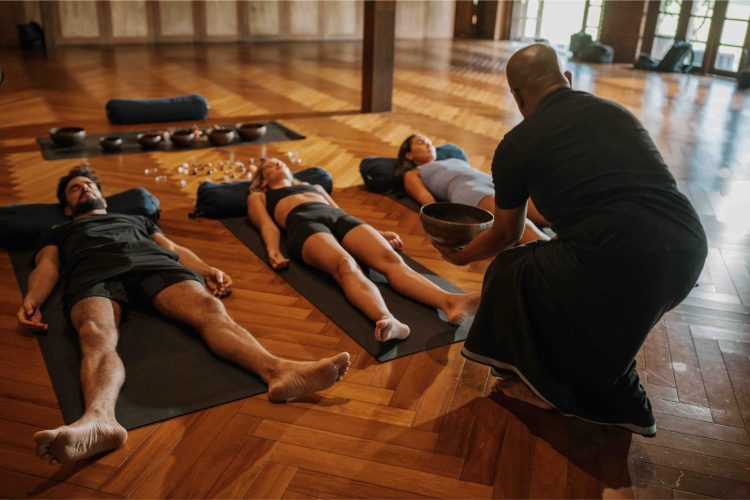Introduction: The Voice as Medicine
There are moments when words fail—when emotion becomes too vast, too raw, or too primal to be captured in sentences. In such moments, the body knows to cry, scream, moan, hum. Sound emerges not as language but as release. Across cultures and centuries, the human voice has been used not just to communicate but to heal. From sacred chants in Tibetan monasteries to gospel laments in African-American churches, from keening rituals in Celtic funerals to lullabies sung to soothe crying infants, the act of vocalizing emotion has long been a natural form of catharsis. Today, modern healing modalities are rediscovering this ancient truth: sound is medicine, and your voice is one of your most powerful healing tools. Vocal toning and sound healing are not just spiritual practices—they are somatic technologies for emotional release, nervous system regulation, and deep self-connection. They allow you to move pain out of the body not by naming it but by sounding it. They bypass the thinking brain and go straight to the limbic system, the seat of emotion, memory, and trauma. In a world that often silences pain, to sing your sorrow is an act of reclamation.
The Science of Sound and the Human Body
Before we explore the spiritual or emotional benefits of vocal toning, it’s worth understanding the science. Every cell in your body vibrates. Every organ has its own frequency. Your brain waves oscillate in patterns that can be influenced by external sounds. Your nervous system responds directly to vibration, especially through the vagus nerve, which runs from the brainstem to the gut and plays a key role in regulating emotional states. When you hum, chant, or tone, you create internal vibrations that massage this nerve, helping to downregulate stress and promote a sense of safety.
Studies have shown that vocalization—especially humming and chanting—can:
- Lower blood pressure and heart rate
- Increase heart rate variability (a marker of emotional resilience)
- Boost levels of oxytocin (the bonding hormone)
- Decrease activity in the amygdala (the brain’s fear center)
- Stimulate the parasympathetic nervous system (rest and digest)
Furthermore, specific tones can entrain the brain into different states. For instance, slower chants can guide the brain into theta waves associated with deep meditation and emotional processing, while rhythmic toning can activate alpha waves related to calm alertness and creative flow. In short, your voice is not just sound—it’s frequency medicine.
Vocal Toning: A Simple but Powerful Practice
Vocal toning is the practice of sustaining vowel sounds to create healing resonance in the body. Unlike singing, there’s no melody or performance involved. It’s about presence, not pitch. You might tone a simple “AH” or “OHM” or “EEE” and notice how the sound feels in different parts of your body.
Each vowel tends to resonate with a different region:
- AH: Heart, emotional center
- OH: Lower abdomen, grounding
- EEE: Head and crown, mental clarity
- OO: Throat and chest, communication and grief
- MM: Facial bones and skull, soothing and centering
The beauty of vocal toning lies in its simplicity. Anyone can do it. You don’t need to be a trained singer. You just need breath, voice, and intention. As you tone, you’re not only vibrating tissue—you’re creating an internal environment where emotion can surface, move, and integrate.
Emotional Catharsis Through Sound
Pain that cannot find a channel becomes illness. Unexpressed grief can become depression. Repressed rage can become inflammation. Suppressed fear can become chronic anxiety. The body keeps score, but it also holds the key to release.
Singing your pain is not about crafting a beautiful song. It’s about letting the sound of your suffering rise unedited. It might come out as a sobbed chant, a shaky hum, a ragged wail. This kind of vocal expression often bypasses the mind’s defenses. It may feel awkward at first—especially in a culture that teaches us to be quiet, composed, and in control—but as you let yourself vocalize what words cannot say, something shifts.
Sound is vibration, and vibration moves what is stuck. When you use your voice to express raw emotion, you’re not indulging in drama—you’re metabolizing energy. You’re giving form to what was previously formless. You’re letting your body speak the language of healing.
The Link Between Voice and Identity
There is a psychological reason why so many people feel uncomfortable using their voices. From early childhood, many of us were silenced—told not to cry, not to be loud, not to interrupt. For some, using the voice became associated with shame or punishment. For others, it became a source of performance and perfectionism.
But your voice is not just a tool—it’s a mirror of your inner world. When you reclaim your voice, you reclaim parts of yourself that were hidden or denied. Singing your pain can bring up memories, images, or sensations you forgot you carried. It’s an act of integration.
In sound healing sessions, people often experience a sense of “meeting themselves” for the first time. They hear their grief, their strength, their longing, their inner child. Over time, vocal practice becomes not just a release tool but a self-love ritual. Your voice becomes a place of belonging.
Group Chanting and Collective Resonance
While solo vocal work is powerful, group chanting offers a unique form of healing. When multiple voices harmonize or repeat the same sound, something magical happens: a field of resonance is created. This field has the power to regulate group nervous systems, build social bonding, and foster a sense of sacred connection.
Research shows that group singing increases oxytocin levels, enhances immune function, and even synchronizes heartbeats. In traditional cultures, collective chanting has long been used to mourn, celebrate, heal, and pray. From Gregorian chants to Sufi zikr to medicine songs in Amazonian ceremonies, these practices unite the individual with the collective, the personal with the universal.
Group toning also helps dissolve shame. When you hear others vocalizing raw emotion, you feel permission to do the same. Your pain is no longer isolated—it becomes a shared human experience.

The Nervous System and Sound-Based Repatterning
The autonomic nervous system is shaped by experience, but it can be retrained through repetition and resonance. Vocal toning helps create new patterns of regulation. By repeatedly engaging in practices that soothe the vagus nerve and build felt safety, the nervous system begins to expect safety instead of threat.
In practical terms, this means fewer anxiety spirals, more emotional stability, and an increased ability to handle stress without collapse or explosion. Over time, toning creates what trauma therapist Deb Dana calls a “vagal tone library”—a set of inner templates that guide the body back to regulation.
Because vocalization is self-generated, it also builds a sense of agency. You’re not waiting for the world to calm you down—you’re using your own voice to return to center.
Integrating Vocal Healing Into Your Daily Life
Vocal toning doesn’t require special equipment or large amounts of time. You can integrate it into daily rituals in small, meaningful ways:
- Morning ritual: 3–5 minutes of “AH” or “OM” to center before the day begins
- Emotional first aid: Humming when you feel anxious or overwhelmed
- Shower practice: Using acoustics to sing, moan, or chant in privacy
- Grief release: Creating a sound bowl where you express sadness vocally without words
- Evening grounding: Low-pitched humming or “OO” sounds to settle the nervous system before sleep
Make space for spontaneous sound. You don’t need a structure every time. Let the body lead. Let the voice follow emotion. Allow sounds to be imperfect, broken, beautiful. Over time, your voice will feel less foreign and more like home.
Sound Healing Instruments vs. Human Voice
Crystal bowls, tuning forks, gongs, and chimes are often used in sound healing sessions. These tools offer pure, sustained frequencies that can help entrain the brain and relax the body. While powerful, they are passive experiences. The human voice, by contrast, is interactive, participatory, and deeply personal.
Your voice carries your frequency. It reflects your history, emotion, and intention. When you use your own voice, you’re not just receiving healing—you’re generating it. This makes vocal toning uniquely empowering. It fosters embodiment, ownership, and real-time feedback between sound and sensation.
Using both tools can be complementary. For instance, you might start with a crystal bowl to set the tone, then layer in your own hums or chants. The combination of external and internal vibration can create a deeply immersive healing experience.
Conclusion: Let Your Sound Set You Free
When you sing your pain, you break the spell of silence. You tell the nervous system: it is safe to feel, to express, to release. You remind the body that trauma can move, grief can flow, and joy can follow. Sound does not ask you to understand your pain—it invites you to experience its transformation.
In a culture that prioritizes intellect over intuition, speaking over sensing, and perfection over presence, vocal toning is a quiet revolution. It brings healing back to the body, to the voice, to the breath. It reclaims the sacredness of expression.
Your voice is not broken. It is not too loud or too strange. It is the instrument you were born with to transmute pain into power. Every tone, chant, and moan is a step toward wholeness.
So the next time you feel something too big for words, don’t explain—tone it. Sing it. Hum it. Cry it. Let the sound carry it out of your cells and into the space where healing happens.
Your voice knows the way.







































